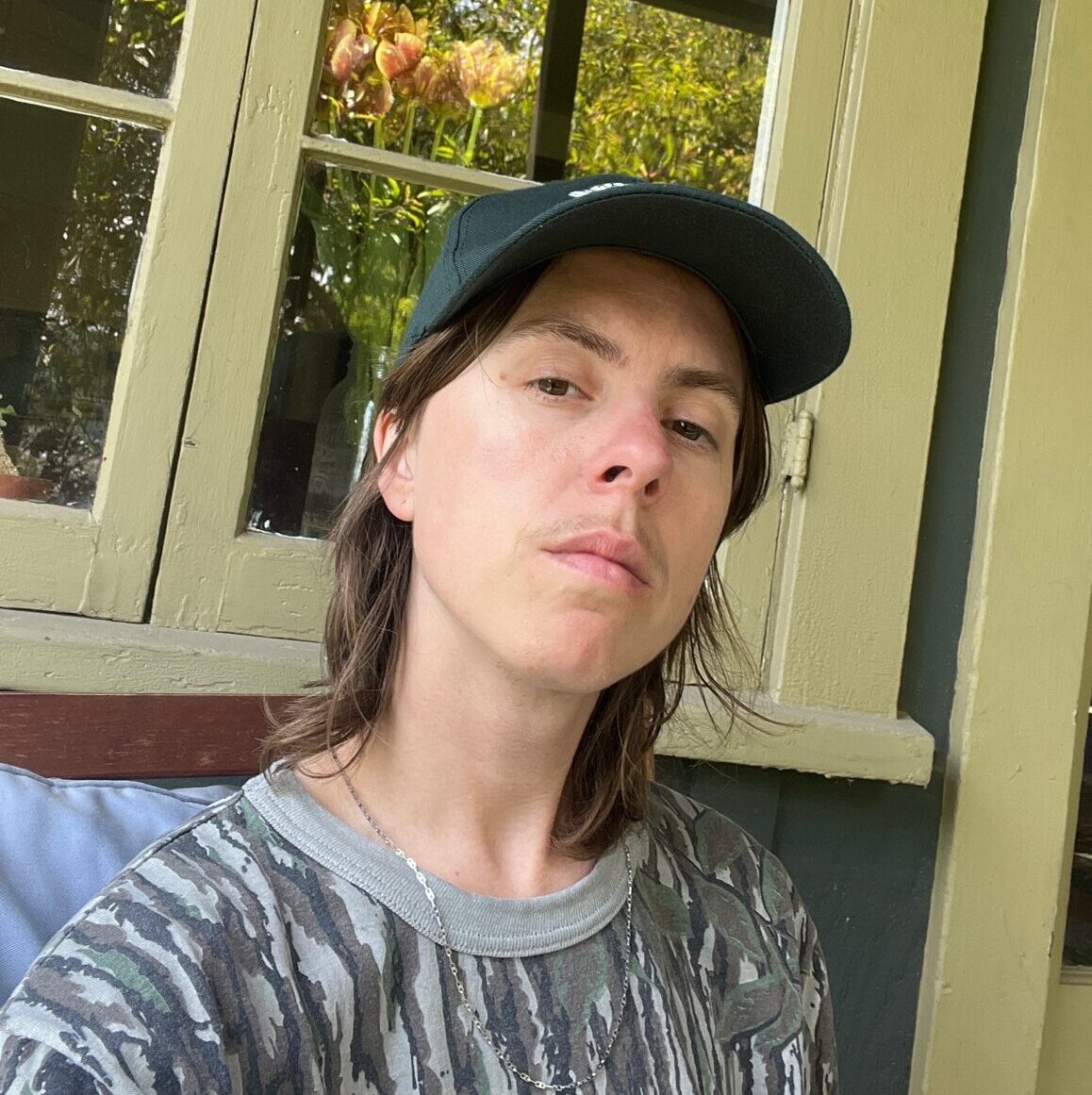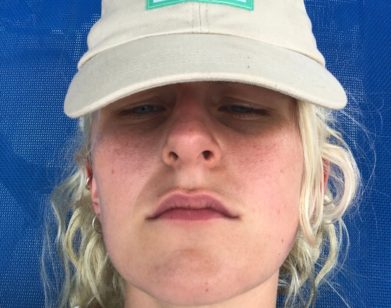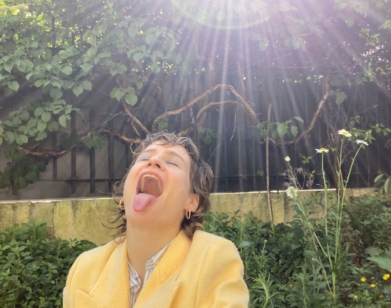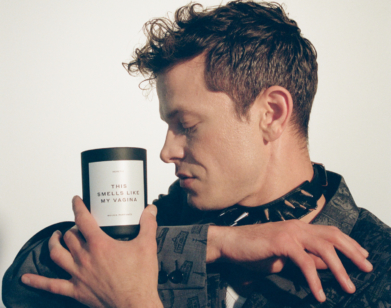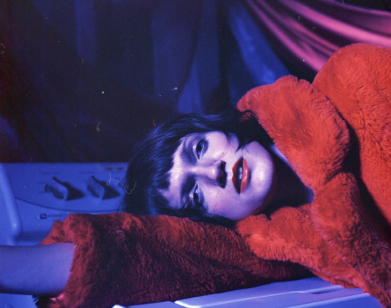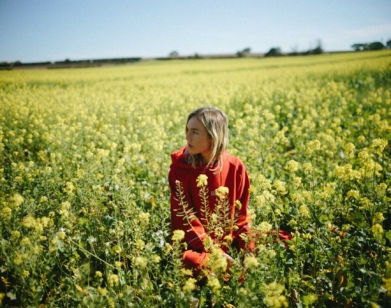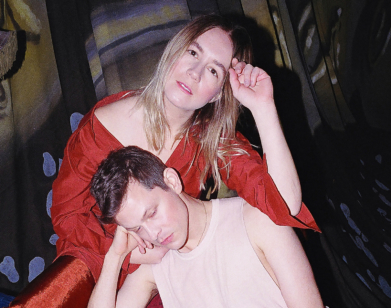IN CONVERSATION
Hand Habits and Perfume Genius on Making Music Under Capitalism
Perfume Genius might be one of the only things left over from indie sleaze that isn’t totally cringe (or a complete hot mess). The artist, whose real name is Mike Hadreas, has been releasing his own brand of outsider pop since 2010. At the time, his music didn’t quite fit into the culture, with its lush pianos and lo-fi melodies, but it nevertheless became an undeniable part of the zeitgeist. Since then, he’s continued to create haunting, singular pop that feels simultaneously on trend yet apart from his peers. A long time collaborator of Perfume Genius, Hand Habits also fits into this same space, crafting strange, slightly avant-garde pop that’s still at home on a playlist with Phoebe Bridgers. Hand Habits, the moniker of musician and guitarist Meg Duffy, just released their new EP, Sugar the Bruise. And on a recent (very) sunny day, the two musicians talked about singing, songwriting, and what it’s like making art in a capitalist hellscape.—ALEX WEISS
———
PERFUME GENIUS: Let me say something real quick.
HAND HABITS: Okay. Off the record?
GENIUS: Either record, on or off. I’ve been having a problem with my voice, singing and losing my talking voice and my singing voice, and I don’t know what is happening. I went to the doctor and I really dislike him. He basically told me there’s nothing wrong with me, except that I should go to a speech therapist, like a vocal coach. But I’m like, “It’s my talking voice too.” Like, I need to learn how to talk differently? Is that what’s hurting my voice?
HABITS: It could be. My cousin did that. I don’t think she’ll read this, but I didn’t talk to my cousin for a long time—maybe five years or something. I talked to her on the phone and she was like, “Do you notice anything different about me?’’ I was like, “No, I don’t.” Apparently she had a speech impediment before. Her voice did sound different when I talked to her, but I just didn’t really think about it because we hadn’t talked in five years. I guess she was speaking, air quotes, “wrong.”
GENIUS: Well that’s what I’m worried about.
HABITS: That’s what you think is happening?
GENIUS: Well, I notice when I sing from my diaphragm and when I don’t, and it’s like, I’m talking from a deeper place now. Sometimes I don’t talk from there. I talk kind of like from the roof of my mouth and my nose. Especially when I want to be quiet because I don’t want anyone to hear me talking a lot in public. So I purposely talk very quietly.
HABITS: I actually did notice that your voice sounds… you sound relaxed.
GENIUS: Maybe I am.
HABITS: Are you going to go to a vocal or speech therapist?
GENIUS: I am, but I honestly think it’s a sinus thing. I think my doctor’s just lazy, but it was an interesting idea.
HABITS: Maybe you could go to Mimi Raver. She is my vocal teacher. I took lessons pretty consistently for a year-and-a-half. I still take lessons from her now every once in a while. But now I feel like I have the foundation and it’s just up to me practicing. Because it is muscles–it’s like when you don’t work out and you try to do a pull-up or a sit-up or something. I recently realized that I was singing from the wrong place. I would always hurt my voice after every show and kind of blow my voice out and just strain and try to hit these high notes. I think it came from just trying to sing like other people, trying to sing like Angel [Olsen] or something. People have these powerful belty voices and my body’s just not built that way. My throat would close. Then when I started doing vocal lessons, I learned what you were saying—just how to expect where something’s going to come from. It was wild how much of that was psychosomatic, too. Even just hearing the note in my head, really crystal clear before I sing it. Training my range to know whether I’m singing from… Then the last six months—I guess the last Perfume Genius show was in December, when we played at the Knockdown Center. I haven’t really been singing that much since then. I sang a bit this past weekend, and it was easier. I felt like the break actually helped.
GENIUS: Like a rehab?
HABITS: It was a rehab in a way where, I don’t know… I thought that I was worried to start singing again because I thought I wouldn’t be able to do it. I thought it would be worse. Actually, I think after taking the vocal lessons and practicing a lot, where I had to overhaul the way I was singing completely and learning to sing with you too—that’s why I took vocal lessons, because when I joined your band, I was like, “I gotta figure this out.”
GENIUS: Because it’s a different range. It’s not even in my range and it’s my music!
HABITS: Well, I feel like that’s what’s next for me: writing songs in the right range or something.
GENIUS: The last album I did.
HABITS: You did? As opposed to the one before, you didn’t do that?
GENIUS: The first four, I didn’t think about it. I just wrote the song. Do you know what I mean? I sang how I wanted to sound, not really going with how I actually do.
HABITS: Right, or how it feels to sing it. Damn, it’s so bright out here now.
GENIUS: We can go inside.
HABITS: It’s nice out but I’m squinty. But yeah, taking a break was really good. I feel like after I had the tools I wasn’t overthinking it so much. Have you ever had that feeling where you just don’t do it for a long time and then you do it and it just sort of clicks?
GENIUS: I have that with performing more than singing. Singing always feels very physical to me. Sometimes it’s there and sometimes it’s not. Then I have ways around when it’s not where it’s still okay. There’s just times where I can sing really well. I really don’t know what the formula is. It’s just a complex system. All of these systems are very complex. That’s what I’m starting to realize, and I don’t like it.
HABITS: It’s the body.
GENIUS: I don’t like that.
HABITS: I don’t either. I think trying to figure them out and how they can all be harmonious together. I do like that, though, because I’ve experienced it when it’s working. So have you.
GENIUS: For sure, but I don’t remember why.
HABITS: I’ve actually been thinking about this a lot where it’s like, you’ve made so many records now and you’ve done it in different ways. I am about to put out my fourth release. And I was making a set list and it was like, “Oh, these are all these different songs and these different eras and these different ways of how I’m working within the system of making music or writing songs.” I overthink it sometimes because I’ve done it so many different ways now.
GENIUS: Overthink what part of it?
HABITS: All of it. I think I can just overthink all of it sometimes and over-complicate it, because I think I understand where something’s coming from or what I’m doing, but actually most of the time I don’t at all. It’s just happening or something. Does that ever happen to you? When you first started playing, were you thinking about all of this stuff?
GENIUS: No. I always feel the most pressurized when I’m not doing any of it. Like right now, honestly, when I know I’m going to have to write another record. I don’t ever start the writing until that feeling subsides.
HABITS: Which feeling?
GENIUS: That pressure feeling. I need to make something that’s going to support Wanda [Perfume Genius’s chihuahua], and everybody’s going to like and make me really successful, blah, blah, blah. Just wondering if people are going to like it again or if I’m going to be able to do it… All that stuff.
HABITS: You don’t write until that feeling’s gone? That’s part of your practice?
GENIUS: Well, I write a little—it’s usually something not very good. It’s just a frustrating time, but I think of it as part of writing, I guess.
HABITS: Have you learned to accept that?
GENIUS: Yeah. I just know that it happens every single time. Then eventually I get to a place where I feel more like a little baby, just playing and seeing what’s there, and rolling around and singing. Then also, somehow it turns into ambition, too. All that pressure, I figure out how to use it as fuel to support the baby stuff.
HABITS: When did you figure that out? Was there a moment when you were starting to get the hang of this cycle that you’d fall into?
GENIUS: I mean, I kind of figured out how to do all this in front of everybody, because the first album was home recordings, and I had never played a show or sang in front of anybody. Then as I started adding things that were scary to me, simultaneously, they also were really inspiring. They pushed me. I always like to be a little uncomfortable or something, but in a way that feels really inspiring. It takes a while to get there. You have to go through a lot of discomfort.
HABITS: I was just thinking about that today in talking with my friend Luke Temple, because when I made the record that I made with him [Sugar the Bruise], I didn’t have any songs really that were done going into the studio, except one was kind of done. But the way I was sitting with it, I knew it was good, but I didn’t know how to make it presentable yet. I was so scared going in. We only had 10 days in the studio and I’d never done that. Usually how I write is I’ll sit with a song and play it live.
GENIUS: Y’all completely just made up songs together from scratch?
HABITS: I had a lot of half-finished little ideas. It was a bootcamp in that sense, where we just had 10 days and I had a couple ideas. Then basically Luke would just either be like, “That’s great, just finish this.”
GENIUS: That’s what I mean about finding these counterpoints—there’s still a tension and it’s kind of uncomfortable, but it’s inspiring and motivating.
HABITS: Well, the tension can be really, really inspiring and doing things that felt out of character, too, because that’s uncomfortable. I feel I’m just now starting to understand that this is all part of it, because I feel this way every time I make a record, too. Or I’m like, “I don’t even know what kind of song I want to write.” Especially because there are so many ways to write music, and I go through phases. With this one, I thought I wanted to write a boring record—sort of just like a chiller, low tempo, with pretty simple chords. I did a song that was like that recently in the studio and it’s not done, but when we left, I was like, “This is boring.” I wasn’t excited about it. Half of the time when I’m writing, I feel like I’m rebelling against something that I think I should be doing. It’s just a trick. I think I’m in the phase that you’re explaining, when you feel like you’re being pressured or something, and all the fears or desires of just wanting to have success or be able to support yourself or all those reasons… I haven’t gotten past that yet.
GENIUS: I started trying to paint or do other creative things that were not monetized to see what it would do. Honestly, nothing.
HABITS: How has it been?
GENIUS: I only did it once. I wasn’t even thinking about it. All of that stuff, it doesn’t have to be counter to inspiration, it’s just… I don’t know. It’s a complex system, like we said.
HABITS: Yeah. Capitalism, too.
GENIUS: Yeah, capitalism.
HABITS: Really. That’s the one.
GENIUS: I think that’s the main thing, honestly.
HABITS: I do too, because it’s like we’re commodified and our expressions are commodified and then held up against other people’s expressions. That obviously has a complex dynamic and changes the relationship with the art itself, because it can’t not be influenced by it after a certain point, because there’s other people that want our expressions to make money.
GENIUS: Well, it takes a bunch of people to get it out there and to do it. So even though I’m the initial pattern-maker of everything, it takes a bunch of people to do it. Then it feels like they’re all relying on that initial thing I make. So there’s a lot of pressure on the initial thing.
HABITS: What’s your relationship with trusting the people you’re collaborating with? When you are in that space, how do you stay true to yourself and trust other people?
GENIUS: I don’t know. It’s ongoing. I don’t think I have figured that out. I mean, I’m better at it now, and every time I do something, I learn a little more about how to do it. I love everything that I’ve put out. I don’t regret any decision I’ve made, but there are times where I’ve made something and I’d be like, “Oh, I could have done this differently,” or whatever. I don’t really like collaborating that much, honestly. I think it’s because I’m very sensitive and I don’t like feedback. Also, I think I have a hard time separating what I make from who I am.
HABITS: Totally. I’ve got to get my sunglasses.
GENIUS: Where’s my umbrella? We have an umbrella. But as much as I say I don’t like collaborating and don’t like feedback, I pretty much surround myself with really opinionated people that give me a lot of feedback because I don’t want to ever lose the thing that makes it connect. If it’s up to me, sometimes I worry that I’m just going to make something I like. So, ultimately, I do welcome it because it keeps me from indulging too much in my own thing, which is not what I want to do
HABITS: I mean, songwriting is indulgent in and of itself.
GENIUS: Some of my favorite musicians, you can tell when they stop listening to other people, they stop collaborating and they just make some really wack music.
HABITS: I know. I’m afraid of that, too. I thought I wanted to do that, then that’s what happened on the song that I did that was simple. I thought I wanted to do a record just on my own. Like, “I’m going to produce it and just play everything,” because that’s what I did for my first record. Now I’m like, “I don’t think that’s a good idea.” There would be a 47-minute-long song of me just playing two chords. It is nice to share it with people and have it serve a purpose for them, too.
GENIUS: I mean, it’s good to entertain things and to push yourself, but also you just do it how you do it.
HABITS: Right. I know. It’s that discomfort thing. I want to evolve. I want to be uncomfortable and be able to get better, or not even better or worse, just expand and be able to get in the flow state in different ways. When I first started singing, I could barely even sing and play guitar at the same time. Then you get in the flow state and you’re not even thinking about it. It takes so long to be able to merge those because there needs to be moments where you go in and it’s not working, and then you stop because sometimes pushing through it just doesn’t feel good. It just can spiral into, “I should quit music,” or something. Honestly, that was the biggest part that I liked about everybody being locked down. I just felt like I had time to search and explore. I’m not really good at making that time for myself. Plus, I need to make money and work. So I’m not as good as other people just not being social, because I feel really inspired by that too, when I go to shows or see friends during the day. I can get a little stir-crazy by myself.
GENIUS: You seem very rigorous to me.
HABITS: But sometimes I just want to be even more that way. Go even deeper.
GENIUS: Or in a way that’s counter to how you normally do it. Some different dimension of it.
HABITS: Right. Like, not look at my phone all day. Not like, go do a residency or something.
GENIUS: See, I want the opposite. I need to start leaving my house and doing shit. I don’t want to though.
HABITS: You don’t have to.
GENIUS: Alan [Wyffels, Perfume Genius’s boyfriend and collaborator] wants to go dancing tonight. I don’t want to do that.
HABITS: Cute. That sounds fun. What kind of dancing?
GENIUS: Line dancing.
HABITS: Stud Country?
GENIUS: Have you been to it?
HABITS: No. I want to go though. Where does it happen?
GENIUS: I don’t know. Some gay area.
HABITS: Right, some gay area. How long have we been talking? We can be done now I think.
GENIUS: Whatever.
HABITS: Is there anything else you want to say?
GENIUS: I love you.
HABITS: I love you, too.

